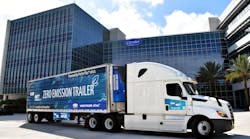Carrier strengthens electric capabilities with new alliance
Carrier is expanding its electrification capabilities through a new alliance with ConMet, adding wheel-based power generation that captures energy that otherwise would be wasted during braking events.
The alliance also advances Carrier’s broader zero-emission transport refrigeration solutions, with the availability of electric options for trailer, truck, and light commercial vehicle customers before the end of 2022, helping address upcoming emissions regulations, according to the company. ConMet manufactures wheel hubs, structural plastic, aluminum casting components, and advanced transport technologies for CVs.
“Teaming with ConMet allows Carrier to deliver more sustainable solutions to its customers, helping companies green their fleets and supporting their environmental, social and governance (ESG) goals,” said Tim White, president of refrigeration at Carrier. “By the end of this year, we will have electric options for customers in trailer, truck, and light commercial vehicle refrigeration applications, and new technologies such as this wheel hub power generation solution for trailers that can help further address environmental regulations.”
Carrier says its ability to reduce customers’ carbon footprint by one gigaton, a key piece of its 2030 ESG Goals, is strengthened through this new alliance.
ConMet’s eMobility division developed the PreSet Plus eHub system, an in-wheel electric motor application that repurposes energy from coasting and braking, providing electric solutions for medium- and heavy-duty CV markets. When paired with a Carrier Vector unit, this technology can deliver a zero-emissions transport refrigeration solution, the companies said.
“We see this alliance as a great strategic fit,” said John Waters, ConMet President. “Carrier and its customers are in a position to best leverage this electric hub system application and add scale. Our technology helps expedite the adoption of clean transport refrigeration solutions that will eliminate the need for diesel fuel engines.”



